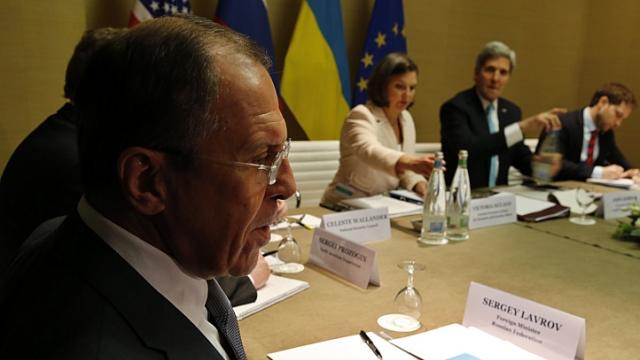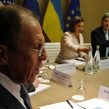
Dead in Geneva: The Compromise With Russia on Ukraine
Publication: Eurasia Daily Monitor Volume: 11 Issue: 80
By:

Russia is inadvertently helping Ukraine, the United States and the European Union to escape the trap of the April 17 Geneva Joint Diplomatic Statement “On the Situation in Ukraine” (https://www.state.gov/r/pa/prs/ps/2014/04/224957.htm). The quadripartite statement was, in fact, dead on arrival in Geneva, as Russian President Vladimir Putin announced an ambitious program of territorial irredentism against Ukraine on that same day (Interfax, April 17).
During the intervening two weeks, Russia’s conflict operations against Ukraine have voided the Geneva statement and destroyed the quadripartite framework. The document has placed no restraints on Russia’s behavior and that of its proxies in Ukraine’s Donbass region. Recognizing this fact, Washington and Brussels are responding with indignant protests.
Jointly issued by foreign affairs ministers Sergei Lavrov of Russia and Andriy Deshchitsya of Ukraine, US Secretary of State John Kerry, and EU Foreign Policy High Representative Catherine Ashton, the Geneva statement was basically a product of Russia-US bilateral negotiation, to which the EU and Ukraine subscribed.
However, the Geneva joint statement does not explicitly hold Russia to any obligations with regard to Ukraine or international law. On the contrary, it stipulates certain obligations for Ukraine, implicitly allowing Russia to be one of the judges of Ukraine’s compliance. Moreover, it places Ukraine at a disadvantage vis-à-vis Russia in any follow-up negotiations, if these are based (as was intended) on the Geneva statement. From a Ukrainian and Western standpoint, this document’s minuses far outweigh its pluses.
On the plus side, the quadripartite format creates a three-to-one majority to ensure that Ukraine is not relegated to a Russian sphere of influence. This format excludes opposition leaders, such as “federalism” advocates Mikhaylo Dobkin and Oleh Tsaryov, whom Moscow wanted to be included in the Geneva negotiations. The joint statement makes no reference to Ukraine’s “federalization,” “Russian-speaking population” (the Kremlin’s misleading propaganda term in Ukraine and beyond), or Ukraine’s non-bloc status (which Russia wants to sanctify irreversibly). At this stage at least, the document does not open the way for Russia’s intrusion into Ukraine’s constitutional processes. The US stood firm on all those points, in line with Ukraine’s interests, during the negotiation with Russia leading up to Geneva.
On the minus side, the joint statement fails to define the ongoing conflict for what it is, namely an inter-state conflict between Russia and Ukraine. This is how the US actually regards the ongoing conflict; but the US apparently yielded to Russia on this primordial matter in the negotiations. Instead, the Geneva statement implicitly but clearly treats the conflict as an internal one in Ukraine, which is consistent with Russia’s position.
Most of the document’s flaws originate in this concession. The Geneva statement omits any mention of Ukraine’s territorial integrity and internationally recognized borders. It calls twice for “steps to de-escalate tensions,” but it clearly points in both cases at internal tensions in Ukraine, and fails to trace those to external interference. (Meanwhile, Ukraine and its Western partners are urging Russia to de-escalate in their bilateral demarches to Moscow, outside the Geneva framework). The document says nothing about Russia having to de-escalate its military deployments along Ukraine’s borders, paramilitary infiltration into Ukraine, or psychological warfare against Ukraine.
Similarly, the Geneva statement places its call to “refrain from any violence [and] intimidation” clearly within Ukraine’s internal context. It fails to link “intimidation” with any Russian actions (e.g., military intimidation). Meanwhile, Moscow threatens Ukraine with military invasion, in the event that Kyiv attempts to restore order in Donbass.
Further on the minus side, the joint document is silent about non-interference with Ukraine’s May 25 presidential election. Russia openly threatens to derail the election in parts of eastern Ukraine through paramilitary operations there. There is not a whiff of Russian recognition of Ukraine’s government, whom Russia continues to treat as illegitimate. The Geneva document does not mention the word “Ukrainian government.” Even in the section about cooperation with the OSCE (see below), the statement merely references “Ukrainian authorities.” Apparently, the Russian side expunged the term “government,” which the US had most likely sought to include during the drafting process.
Under the Geneva document, “all illegal armed groups must be disarmed” (by whom and how, remains unsaid); and all public spaces that they illegally occupy must be vacated. Russia interprets this as applying to the Right Sector and similar groups in Kyiv and elsewhere in Ukraine. But Russia disclaims any responsibility for disarming and withdrawing its own paramilitary proxies from Ukraine’s Donetsk and Luhansk regions. For its part, the Ukrainian government feels too weak to take on the Right Sector in Kyiv while facing Russian threats at the same time in the east.
The quadripartite statement confers on the OSCE “a leading role in assisting Ukrainian authorities and local communities in the immediate implementation of these de-escalation measures” (again implying an internal conflict within Ukraine, despite it being conducted by Russia against Ukraine). Several EU member countries had proposed sending a European Union monitoring mission to Ukraine. This would have been consistent with the Ukrainian government’s stated European aspirations and the EU’s support for the EuroMaidan to lift this government into office. Within the EU, however, Germany led a push for sending an OSCE mission instead (not to be confused with the military observers detained by Russia’s proxies in Slovyansk). Relying on the OSCE for conflict mediation amounts to relegating Ukraine to the “gray zone” between the EU and Russia, where the OSCE operates under Russia’s veto power.
The Geneva statement purported to create a framework for negotiations toward conflict-resolution. However, it misdefined the conflict as internal to Ukraine, overriding Kyiv’s objections. Heavily weighted in Russia’s favor in many of its aspects, and failing to restrain Moscow, the quadripartite document marked a false start to further negotiations. All this should make it easy for the US and EU to discard the flawed Geneva document, instead of attempting to resurrect it.




